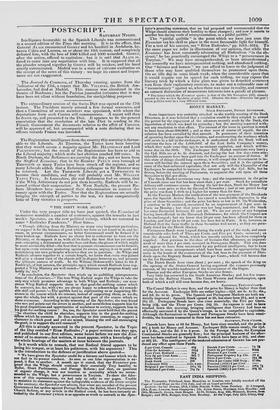"THE DIRTY WORK AGAIN."
Under the very proper title we have just quoted, the Examiner of to-morrow marshals a number of sentences, against the remarks in last week's Spectator, on the new political variety, which we ventured to name " Radicalus Paradoxus." Hear him-
" Though differing from the Ministry on many very important particulars, we suppor t it for the balance of good which we have as yet found in it, and i be- cause, cause, in present circumstances, no better Government could be formed f t were broken up. Radicals have no choice but to endeavour to turn out the Ministry, or to support it as, with all its faults, the best that has yet existed, and—excepting a detrimental member here and there, the places of which might
be more serviceably filled—the best that in present circumstances can be formed;
but upon every occasion protesting against its errors, urging it on to good, and maintaining our own principles whenever they are in question. As Whigs and Radicals advance together to a certain length, we know that every step gained will give a clearer view of the objects still in dispute between us, and promote the ultimate success of truth. In Sir William Molesworth's letter to Sir J. Rashleigh, of last autumn, the principles upon which stanch Radicals have sup. ported a Whig Ministry are well stated= If Ministers will progress firmly and boldly in,' &c.8 "In conclusion, the Spectator thus winds up its quibbling misrepresenta- tions of the Examiner—, The true Whig-Radical urges the Whigs to take the only step which promises advantage to bath Whigs and Radicals; our mon- strous Whig-Radical supports them in that good-for-nothing course which be censures, &c. &c. with (we are always happy to acknowledge it) remark- able skill and power.'—The quibble here is, representing us as supporting Mi- nisters in the course which we censure, instead of supporting them, as we do, upon the whole, but with a protest against that part of the course which we deem erroneous. According to the reasoning of the Spectator, the true friend who sees and points out the errors in another, and nevertheless supports him for his go9d dispositions and opportunities of usefulness to society, supports him in his good-for-nothing course ! So, too, the Spectator must hold that the parent 'iso chastises the child he cherishes, supports him in the goo(l-for-nothing Mese which he censures. In fine, according to this reasoning, to support a character in which good and evil are mixed, blaming the evil and encouraging the good, is to support the evil censured." All this is already answered in the present Spectator, in the Topic of the Day entitled "Rix Radicales ;" a paper written two days ago, and published in our first edition, some hours before we saw the Exa- miner of to-morrow—but written, it must appear, with a knowledge of the whole bearings of the matters at issue between the journals.
Is it worth while to remark, that our Radical friend appears to be losing his temper, or at least his politeness, with his argument? This is the introduction to the defence or justification above quoted-
" We have given the Spectator credit for a fairness and honour which we do not find in its present conduct. As soon as one false representation is ex- posed, it flies to another. A month ago it stated, that the Examiner pro- that the Whigs should continue their essentially Tory hostility to ratt, Short Parliaments, and Peerage Reform ; and that, on questions of organic change, it was not inaction or neutrality which we recom. mended to the Whigs, but a perseverance in Toryism. To show the false- ness of this representation, we had only to refer to our pages. Unable to maintain its statement against the indisputable evidence of the iderce scriptx to the contrary, the Spectator now admits, that when any member of the present Government has spoken against Peerage Reform, the Ballot, Short Parliaments, Church Reform, or any article in the Radical creed, he has been instantly at- tacked by the Examiner (which is as opposite as truth to untruth to the Spec- tator's preceding statement, that we had proposed and recommended that the Whigs should continue their hostility to those changes); and now it resorts to another less daring mode of misrepresentation, in a pitiful quibble."
The "pitiful quibble" is the point which we have just seen the Examiner tax his skill to place in the most favourable light for himself. For a test of his success, see " Rixa3 Radicales," pp. 1013-1014. To the same paper we refer in illustration of our opinion, that while the Examiner has been constantly advocating all Radicalism "in the ab- stract," be has practically encouraged the Whigs to a "perseverance in Toryism." We may have misapprehended, or been misunderstood; but assuredly we have misrepresented nothing, and abandoned nothing. Our "fairness and honour" we can afford to leave to the judgment of those who may have qualified themselves to pronounce upon them. On an idle day in some blank week, when the considerable space that it would require can be spared for such trifling, we may expose the literary trick by which a false gloss was given to detached sentences torn from their explanatory contexts, to make out a colourable case of " inconsistency " against us, when there was none in reality, and convert an earnest discussion of momentous interests into a parade of phrases: • The letter which the Examiner quotes is that of the 9th November 1835. already printed in this week's Spectator, at page 10l2. Observe the date—November last gear: when polities were in a very different train.


























 Previous page
Previous page